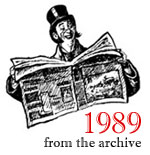
The Underclass, Part III: Drugs
HARVARD DIARY
Sometimes as I walk in a so-called ghetto, or drive through its streets, I have to stop and scratch my head or shake myself out of an incredulity that has seized me, no matter years of work in such communities — the sight of ordinary men, women, and children going about their perfectly ordinary and quite normal lives. We have had good cause, of course, to think of ghettoes as a dense, melancholy tangle of accumulated psychological and social pathology. But often, I fear, we let such awareness distort our sense of what actually obtains in neighborhoods which become, even for the best intentioned of us, a foreign territory of sorts, a far distant “them” among whom all is decidedly not well.
The other day, standing on a street easily describable as one more corner of the American underclass, a street known for its “drug-related violence,” a phrase I keep seeing in the newspapers when reporters refer to that street, I found myself noticing the humdrum, quite delightful particulars of weekend familial life. Mothers and fathers were walking with children. Boys and girls were playing the same street games my friends and I did in our white suburban heaven over 40 years ago. Some elderly women stood outside a store boasting of the virtues of their various grandchildren. Bike-riders added their vitality to the human parade. Shoppers were carrying home their weekly supplies of food. A group of five girls, all dressed up, were obviously on their way to some special ceremonial occasion. A pizza parlor, its smells inviting to my empty stomach, was accommodating its patrons, and several of them, full of anticipation, had just left for home as I walked by.
A ghetto? The underclass? Such abstractions are pushed our way by journalists and social scientists, who command so much of our attention and have become the chief interpreters of our social reality. But as I stood at a particular intersection in the afternoon of yet another day in my lengthening American life, I thought to myself: There is a life here best observed and conveyed by those who don’t make it their business to be “experts” on “ghetto life” or “the drug problem,” and who don’t herd people into “the underclass.” I thought naturally of Ralph Ellison, what he’d tell us of that scene, or yes, as improbable as it seems, of John Cheever and Walker Percy and Eudora Welty, not known for including such neighborhoods in their fiction, and yet such marvelous witnesses to human variety, complexity, ambiguity. We are not, alas, about to turn toward such novelists for the help we need in understanding our social problems — a pity for sure. I’d bet on their vision, though, if it were focused on the urban poor as well as on the bourgeoisie, who are so used to being attended by storytellers.
The foregoing may strike the reader as a long and irrelevant wind-up to a column with this one’s title, and yet I worry that we seem to have a language that in itself precludes the kind of life I have just described. For example, when I was working with black families who lived in a certain Boston section, I was constantly reminded that “drugs” ruled this or that street, to the point that all the life I saw there got banished by my singular ongoing preoccupation with those “drugs,” not to mention other “variables,” such as “race” and “violence” — even though, every day, I met utterly sane and sensible and law-abiding and decent and hardworking people, going about their ways in the manner the rest of us do: working, eating, sleeping, dreaming, hoping, worrying, trying to get through this life from day to day. Still, there were drugs in that part of town (and there are plenty of drugs in well-off, white, suburban towns, though we don’t stress such a presence when we think of those residential areas). By no means did those drugs control everyone’s life, but they most definitely have taken possession of a growing number of lives, and we in this nation now wonder what ought to (or, indeed, can) be done.
You May Also Enjoy
Old categories of class, politics, and education have given way to a deep-down hatred for one another that traditional social sets can no longer begin to explain.
No matter what the Dow-Jones average is doing, “opportunities for work” must be “provided for those who are willing and able to work,” as Pius said.
Review of Ethics and the National Economy

